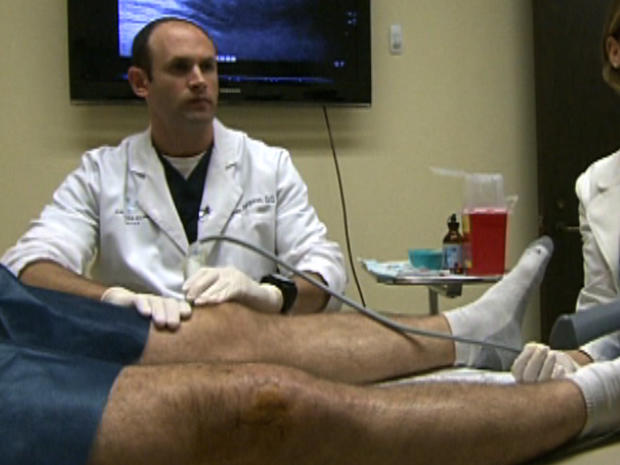4.5 million Americans over 50 have artificial knees: What's behind high rates?
(CBS/AP) More than 4 million Americans over 50 have artificial knees, according to a new study. That's almost 1 in 20 Americans walking around with the help of metal or plastic.
"These data are sobering because we didn't know what an army of people we've created over the last decade," said study author Elena Losina, co-director of the Orthopedics and Arthritis Center for Outcomes Research at Harvard's Brigham and Women's Hospital. "The numbers will only increase, based on current trends."
Losina's study is the first national estimate to show the aging toll on American's knees, especially in baby boomers. The estimate is important because it shows that a big portion of the population might need future knee-related care, said Dr. Daniel Berry, president of the American Academy of Orthopedic Surgeons and chairman of orthopedic surgery at the Mayo Clinic in Rochester, Minn. He was not involved in the research.
People with knee replacements sometimes develop infections or scar tissue that requires additional treatment. Artificial knees also wear out after a period of time, so as the operations are increasingly done on younger Americans, many will live long enough to almost certainly need a second or even third knee replacement.
For the study, Losina and colleagues analyzed census data, national health surveys, and death certificates to determine the number of knee replacements performed from 1998-2009. The researchers found 4.5 million Americans are living with artificial knees, including an estimated 500,000 who have had at least two replacement operations on the same knee. In 2009 alone, more than 600,000 knee replacements were performed in the U.S.
Knee replacements are most common in people older than 80, with about 1 in 10 people octogenarians getting them, the study found. Though they're less prevalent in people younger than that, there are still more than half a million Americans in their 50s with the artificial joints, and based on current trends, operations in that age group are expected to increase. The study was presented Friday at the American Academy of Orthopedic Surgeons annual meeting in San Francisco.
Losina said replacement joints can greatly improve quality of life for people with worn-out knees, but they're not risk-free and it's a major operation that people should not take lightly.
Modern knee replacements in the U.S. date back to the 1970s. Since then, the procedure has advanced in the materials and techniques utilized, including imaging scans to create better-fitting joints, and more durable and lifelike implants.
During knee replacement operations, surgeons slice off a small portion of the worn-out surface on the ends of both leg bones that meet at the knee, then implant an artificial joint usually made of plastic or metal. Operations typically last about two hours, require a few days in the hospital, and cost roughly $40,000.
According to the federal Agency for Healthcare Research and Quality, knee replacements tripled in people ages 45 to 64 between 1997 and 2009.
Doctors think two trends have contributed to the big increase: the nation's obesity epidemic and amateur athletes who don't adjust workouts to spare aging or even injured joints. Both raise their risk to worsen arthritis, the main reason for replacing knees.
"We think that as more and more people began participating in active sports, they sustained injuries earlier in life, and therefore developed knee osteoarthritis earlier," Losina told HealthDay. "And these active people are probably more willing to undergo surgery that will enable them to continue to be active."
Artificial knees generally last 15 to 20 years. Some are promoted as lasting 30 years, but these estimates are based on use among older people more sedentary than baby boomers who expect new knees to let them be as active as they were before surgery. Doctors often discourage knee replacement patients from engaging in high-impact sports including jogging.
WebMD has more on knee replacement surgery.
